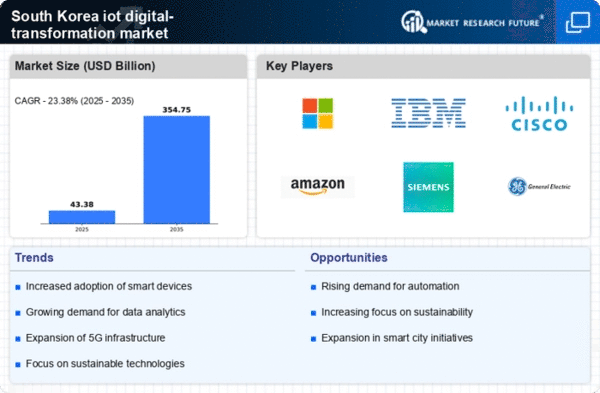Rising Demand for Automation
The increasing demand for automation across various sectors in South Korea is a key driver of the IoT digital-transformation market. Industries such as manufacturing, logistics, and healthcare are increasingly adopting IoT solutions to enhance operational efficiency and reduce costs. For instance, the manufacturing sector is expected to invest over $2 billion in IoT technologies by 2026, aiming to streamline processes and improve productivity. This trend towards automation is not only transforming traditional business models but also fostering innovation in IoT applications. As companies seek to leverage data analytics and real-time monitoring, the market is poised for substantial growth, driven by the need for smarter, more efficient operations.
Consumer Electronics Integration
The proliferation of smart consumer electronics in South Korea is significantly impacting the IoT digital-transformation market. With a high penetration rate of smartphones and smart home devices, consumers are increasingly seeking interconnected solutions that enhance their daily lives. In 2025, the market for smart home devices is projected to exceed $3 billion, indicating a strong consumer preference for IoT-enabled products. This trend encourages manufacturers to innovate and integrate IoT capabilities into their offerings, thereby expanding the market. As consumers become more accustomed to smart technologies, the demand for seamless integration and interoperability among devices is likely to drive further advancements in the IoT digital-transformation market.
Government Support and Investment
The South Korean government actively promotes the adoption of IoT technologies, which significantly influences the growth of the IoT digital-transformation market. Initiatives such as the 'Korea Smart City Project' aim to integrate IoT solutions into urban planning and infrastructure. In 2025, government funding for IoT-related projects is projected to reach approximately $1 billion, reflecting a commitment to enhancing digital infrastructure. This support not only facilitates the development of smart cities but also encourages private sector investment, creating a robust ecosystem for IoT innovations. As a result, the market is likely to experience accelerated growth driven by public-private partnerships and increased funding for research and development in IoT applications.
Advancements in Connectivity Technologies
The rapid advancements in connectivity technologies, such as 5G, are playing a crucial role in shaping the IoT digital-transformation market in South Korea. The rollout of 5G networks is expected to enhance the performance and reliability of IoT devices, enabling real-time data transmission and improved user experiences. By 2026, it is anticipated that over 80% of IoT devices will be connected via 5G, facilitating the development of more sophisticated applications across various sectors. This technological evolution not only supports the growth of smart cities and autonomous systems but also encourages innovation in IoT solutions. As connectivity improves, the market is likely to witness an influx of new applications and services, further driving its expansion.
Focus on Sustainability and Energy Efficiency
Sustainability concerns are becoming increasingly prominent in South Korea, driving the IoT digital-transformation market towards energy-efficient solutions. The government has set ambitious targets for reducing carbon emissions, which has led to a surge in the adoption of IoT technologies in energy management and smart grid applications. By 2025, investments in IoT solutions for energy efficiency are expected to reach $1.5 billion, as businesses and municipalities seek to optimize resource usage. This focus on sustainability not only aligns with global environmental goals but also presents opportunities for innovation in IoT applications that promote energy conservation and reduce waste. Consequently, the market is likely to expand as organizations prioritize sustainable practices.
















